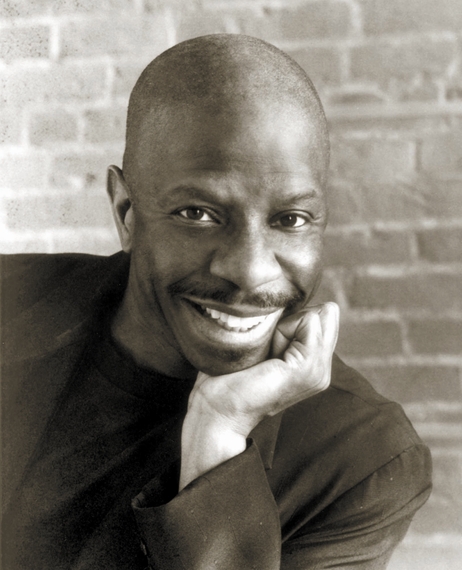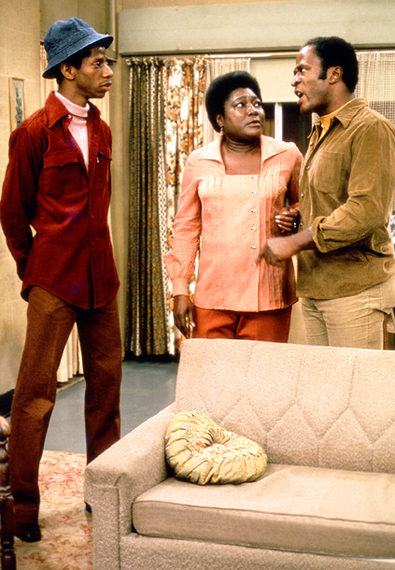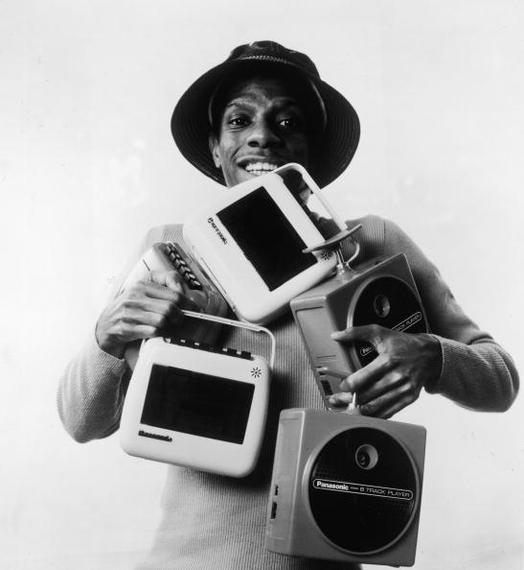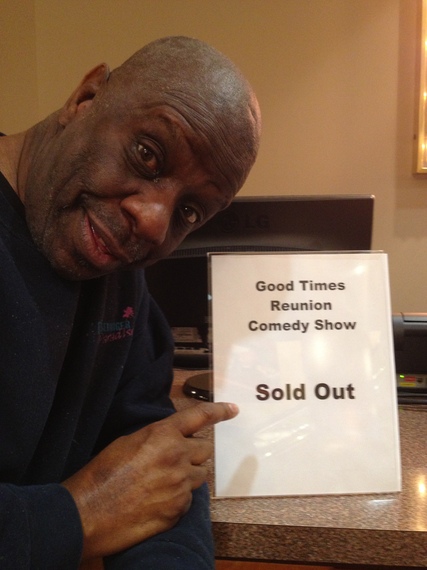You usually don't consider a pioneer as someone raised in the razor-wire, graffiti-strewn projects of the South Bronx.
Or someone who once got their start opening community rallies for the militant Black Panthers and now clasps conservative traits.
But Jimmie Walker is, well, an unconventional sort of pioneer.
"When you think of pioneers," said Walker, "it's usually applied to Davey Crockett, or Daniel Boone, or Lewis and Clark. In television, it is those like Lucille Ball, Carol Burnett, or Jackie Gleason. But I guess there are different sets of pioneers."
Walker shined his brightest as James "J.J." Evans Jr. on the successful television series "Good Times." The show popularized his inimitable smirk and face, and added his catch phrase "Dyn-o-mite!" to the groovy lexicon of the 1970s.
As the jive-talkin' aspiring artist, Walker stole the show. But some critics and cast members disliked "J.J." and what they considered to be his perpetuation of lazy, inarticulate, perpetually childlike characteristics.
From 1974 to 1979, he was condemned for anything from being "too black for television" to later being faulted for, he said, "cooning it up."
Other black comics judged him sternly and some even labeled him as a "Stepin Fetchit" -- the hurtful reincarnation of pitiful caricature.
Norman Lear didn't want to do it -- the "Dyn-o-mite!" slang. John Rich figured that people would go for it -- the slang. But as far as the success of Good Times, it was all Norman Lear. He just really pushed it. He focused on issues of right and wrong, there were episodes of senior citizens eating dog food, drug addiction, and pregnancy out of wedlock -- that was all Norman Lear. With political correctness, you can't have issues. Dad is now the dumb guy - everyone ethnic has a great intellect. If you do an issue, you are going to divide. As a comic, you are asked not to do the Obama stuff, and I guess that with political correctness, like comedy, it's all supposed to be harmonious.
On J.J. Walker: "He Was Damn Funny"
Walker, who was cast as "J.J." without an audition based on his comedy act, said that he has still never watched a full episode of the series.
"As soon as I was done filming, I'd go out to perform at a comedy club, do my show. That is how it was. I was too busy with my stand-up to notice."
While the Evans family projected a loving and supportive front, it was a distinctly chilly set. Co-stars Esther Rolle and John Amos lambasted Walker's character in the press, and Rolle and Amos openly complained that he was a pathetic role model for black teenagers.
Rolle and Amos came from acting backgrounds, and they may have felt upstaged by Walker, who had the funniest lines and punctuated them like he would in a club. Both Rolle and Amos eventually left the program on less than friendly terms.
Other cast members wanted acting moments, acting parts. I wanted the jokes -- damn right. The public wanted him that way and the role just got bigger. The show gave people what they wanted. I found out about a lot of the complaints when the book (he released a biography in 2012) was being researched.
Walker was no teenager on the show, being 27-years-old when it debuted. He said that he modeled "J.J." after Art Carney's portrayal of Ed Norton on The Honeymooners. He not only mirrored the role of Norton, he added his own urban twist. He was the jester on a show that was groundbreaking for its realism, and that paradox both advanced and mired his career.
"I think he was damn funny," said Walker. "I think our show would have rolled along, lasted longer, and been better if everybody had just chilled out and let it happen."
In retrospect, he is humbled by his association with Lear and the director's approach of showcasing a black family facing deep-seeded problems in inner-city Chicago.
Walker: "You Won't See Another Ethnic Cast"
Walker said that there are no sitcoms involving an all-black cast on American television because "an ethnic cast creates too many problems."
When you look at the influence of our show, and what I did, it's crazy. When our show was on, we portrayed a poor black family, and there were a lot of protests. After we were off the air, there was no other predominantly black cast until The Cosby Show. That was our antithesis, a doctor, a wealthy family, clean living, and there was all of the same criticism. 'People don't live like this,' they said. That is the reason you won't see another all ethnic cast. There will be protests and arguments, and doesn't do the networks help. All the shows go quietly, like a 'Mike and Molly.' No complaints there. No bitchin'.
The ethnic is always the smartest person on the show, the police chief, or the principal, or the president. How many times can Morgan Freeman play the president? The ethnic is never going to be played in a negative light anymore. He always has to be the smartest person, the owner of the corporation, or the best in school.
At 66, Walker has not only chilled out, but he has conservatized.
"Obama and the government are fibbing to us all of the time," said Walker. "There are no jobs, things are not good."
On the Road
Jimmie Walker is a fiercely American success story, and the schedule and timing of comedy still invigorates him.
"The success of a comic is related to how successful he can deal with the audience," said Walker. "You have to know what the people are thinking. I'm a populist. If they are not laughing, I know that it's not good -- the material. Comedy has changed to a niche audience, and that's an industry move. For some people, though, the Stephen Colbert niche doesn't work at all.
"I've been a comic for 45 plus years. It's my gig. I'm not going to go work at a car factory one day making pistons. I'm not one of these guys who says, 'I can't wait to retire.' No way. They will have to kick me out -- and they will."
Walker said that there is no such thing as a happy comic, for the comic feeds on his own insecurity and self-doubt.
"The reality is that every comic has a complaint," said Walker. "There is no such thing as a happy comic. From Jay Leno to the guy at the open mic, that is the very nature of comedy. There is no such thing as a happy comic.
"If you receive a standing ovation, you are conditioned to find that one person who didn't like anything you did, and you remember them. But the person who is laughing and rolling on the ground in laughter, you just step over them."
On Jay Leno: "Tremendous Injustice to the Comedy Community"
His breakthrough came in 1973, with his first national TV appearance, on ABC's Jack Paar Tonight. He has been critical of Jay Leno for not lending other comics a helping spotlight.
"The venues are drying up, and I put this on Leno," said Walker.
Years ago, you could go on Johnny Carson, you could be a star and celebrity. When Leno took over, there were no comics. That changed the face of comedy. There are probably 15 comics right now who can sell tickets, and people are shocked that others can't sell tickets, like Leno. You've got 5,000 doing it, and about 15 that can sell. Leno is talented, but he has done a tremendous injustice to the comedy community. No one comic broke out from that show he did.
"It's a tougher business now. People are going back to college and getting other credentials. There are 43-year-old comics living with mom and dad."
Conservative Streak
Walker doesn't shy away from politics and his feelings that Barack Obama "is not the right man for the job" and that he is "not into the gay thing."
"I think we need to have a more civil conversation about gay marriage," said Walker.
Gay marriage is coming in, and I am not for it, I don't believe in it. I do accept it. It's just not what I believe in. It doesn't affect me, I just don't like it. Probably 100 years from now it will be very much a part of the landscape, and they will say, 'Who is that asshole who was against it?' That was me. Nowadays, you have to embrace it and say, 'I'm with you.' Obama surrendered to it and surrendered his views. It was too tough for him to make that transition -- he had to, because the gay community is such a loud constituency.
He calls himself an outcast among black people for harboring such conservative beliefs as supporting the death penalty and believing affirmative action has outlived its utility. At one period he was the Black Panthers' comedian of preference before some in the movement labeled him as a symbol for racial stereotypes on Good Times.
"The purest guy was Stokely Carmichael," said Walker. "He was legitimate. He believed in the Pan-African movement. He was a bright guy, really sharp. His brashness made him not palatable to the commercial world."
Walker: "My Time Was Very Powerful"
Walker is on the road doing his standup routine about 45 weeks out of the year. He's also promoting his book, DYN-O-MITE!: Good Times, Bad Times, Our Times -- A Memoir.
No matter what Walker says or does from here on, there will always be those situations when he will need to correct people when they call him "J.J." and not Jimmie. He doesn't get tired of "dyn-o-mite!" -- and he doesn't view it as a pejorative, or as an insult, or anything off-putting.
"When people remember something that you did," said Walker, "that's a good thing."
Walker can be seen discussing the process of transitioning from stand-up to sitcom in the latest episode of Pioneers Of Television, premiering this week on PBS.
"When I die, the show, and the character, they will still be spoken about. My time was very powerful, and I guess it left a dramatic influence."
Photos Courtesy of Jimmie Walker.
Brian D'Ambrosio lives in Montana. His next book, 'Warriors in the Trenches,' detailing the lives and careers of 30 legendary boxers, entertainment wrestlers, football players, musicians and actors, will be available in the fall.




